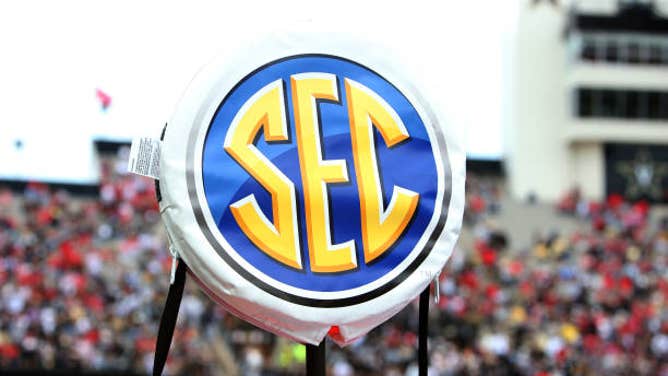ESPN's SEC Bias Might Be Showing Again With Preseason Rankings
Preseason FPI ratings might benefit SEC
The symbiotic relationship between the SEC and ESPN is well-established.
ESPN, as the SEC's primary broadcast partner, benefits when the conference is perceived as being the best in the country. The SEC benefits from increased media attention, and the power of an entire broadcast network promoting its best interests. Especially a network that shows many of the most important games of the season. And carries an immense amount of influence in discussions about the College Football Playoff.
The symbiotic relationship was once again demonstrated in the release of ESPN's new preseason FPI rankings. Rankings that the SEC just recently used in an attempt to promote itself and its regular-season "gauntlet" that could lead to more at-large playoff berths.
READ: SEC Embarrassingly Hands Out Analytics Research To Support Superiority Arguments
And what a surprise! The new ESPN rankings once again heavily promote the SEC.

NASHVILLE, TN - SEPTEMBER 25: A Southeastern Conference logo on a down marker during a game between the Vanderbilt Commodores and Georgia Bulldogs, Saturday, September 25, 2021, at Vanderbilt Stadium in Nashville, Tennessee. (Photo by Matthew Maxey/Icon Sportswire via Getty Images)
Are ESPN Rankings Biased Toward The SEC?
The FPI rankings were published this week, and the top three teams are all from the SEC, as are five of the top 10 and nine of the top 15.
- Texas Longhorns
- Georgia Bulldogs
- Alabama Crimson Tide
- Ohio State Buckeyes
- Penn State Nittany Lions
- Oregon Ducks
- Notre Dame Fighting Irish
- Texas A&M Aggies
- Miami Hurricanes
- Tennessee Volunteers
- Clemson Tigers
- LSU Tigers
- Ole Miss Rebels
- Auburn Tigers
- South Carolina Gamecocks
- Oklahoma Sooners
- Michigan Wolverines
- Florida Gators
- USC Trojans
- SMU Mustangs
- Kansas State Wildcats
- Arkansas Razorbacks
- Missouri Tigers
- Arizona State Sun Devils
- Nebraska Cornhuskers
It's reasonable to wonder how these rankings could be biased, considering they're computer-generated and not based on human votes.
But as several users on social media have pointed out, it's a trickle-down effect. ESPN has its own recruiting rankings, which are often adjusted, as every service does, based on where an individual recruit commits. SEC schools, unsurprisingly, often see their recruits adjusted upwards. And to be fair, the SEC has consistently churned out highly-rated players that have collegiate success and go on to be picked in the first few rounds of the NFL Draft.
Regardless, the recruiting rankings are then incorporated into the computer models used to create the rankings. Schools that do well in ESPN's recruiting are then ranked more highly because of having more perceived talent on the roster heading into the season.
Then those preseason rankings are used to inform voting, and can influence opinions throughout the season. Top-ranked teams don't fall as far as they might, for example, because preseason expectations assumed they would be in the top 5-10.
These FPI rankings in particular are extremely questionable. Auburn has steadfastly refused to be a competitive team for years. Oklahoma was 6-6 last season. Florida finished the year unranked. And Texas A&M in the top-10 is remarkable, considering how consistently mediocre the Aggies have been.
Yes, USC is also probably too high. Michigan too. But when the preseason rankings set expectations for the SEC this high, it has a season-long impact. One that the conference will happily reference to back up its claims of a "regular-season gauntlet."
"This schedule is hard cause Texas A&M was 8th in preseason FPI rankings, see!!!"
Even if they don't actually deserve it.